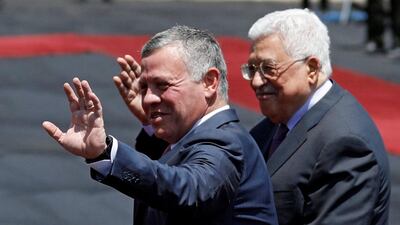Jordan’s King Abdullah II reaffirmed his support for Palestinian rights at a meeting with President Mahmoud Abbas on Sunday, days after he discussed the issue with incoming US president Joe Biden.
The two men are hoping for a shift in American policy under Mr Biden to revive prospects for a two-state solution they regard as having been compromised by Mr Trump’s plan for Middle East peace.
The plan, unveiled in January, ignored Palestinian claims to East Jerusalem and other land, and the illegality of Israeli settlements in territory occupied since the 1967 war.
A Jordanian military helicopter took Mr Abbas from Ramallah to meet the king at his palace resort in Aqaba on the Red Sea, before the Palestinian leader travels to Cairo to meet Egyptian President Abdel Fattah El Sisi on Monday.
Official Jordanian media said King Abdullah told Mr Abbas that Jordan stood “with all of its capacity and abilities” behind realising a “sovereign and viable” Palestinian state on land Israel occupied in 1967, with East Jerusalem as its capital.
“The king affirmed the existing legal and historic status of Jerusalem, emphasising the kingdom’s rejection of all unilateral arrangements that aim at changing the identity of the city and its holy places,” the Petra government news agency said.
The Trump peace plan left the old heart of East Jerusalem under Israeli occupation.
This includes Al Aqsa Mosque, one of the holiest sites in Islam, and other religious sites under Jordanian custody.
A large part of the kingdom’s 10 million population is of Palestinian origin, with relatives in the occupied West Bank and Gaza, and in Israel.
Excluding East Jerusalem from the narrow path to Palestinian statehood that Mr Trump offered has been followed by US moves privately seen by Jordanian officials as provocative.
The latest was 10 days ago when US Secretary of State Mike Pompeo became the first American foreign minister to visit an Israeli settlement in the occupied West Bank.
A joint statement after the meeting in Aqaba said King Abdullah and Mr Abbas “affirmed the need to stop Israeli unilateral moves that compromise the chances for peace and intensify the conflict, such as settlements and annexation of any Palestinian land”.
The Royal Palace said the meeting was attended by Jordanian and Palestinian intelligence chiefs Ahmad Husni and Majid Faraj.
The Palestinian Authority this month resumed security co-operation with Israel, after halting it to protest against Israeli plans to annex Palestinian territory.
The meeting was the first between King Abdullah and Mr Abbas since Washington brokered landmark accords in August between Israel, the UAE and Bahrain.
The Palestinian Authority opposed the deals while Jordan said they could revive Palestinian-Israeli peace talks.
Last week the king spoke with Mr Biden by phone, becoming the first Arab head of state to do so since the Democrat was elected.
A statement by Mr Biden's office said he looked forward "to working closely with King Abdullah on the many interests shared by our countries".
They include counter-terrorism and “addressing other regional security challenges, and supporting a two-state solution to the Israeli-Palestinian conflict".
Jordanian Prof Hassan Al Momani said it appeared that Mr Abbas wanted to hear from the king his views about the “new reality” in Washington and how to deal with the Biden administration, having hoped for the Democrats winning the November 3 elections.
Prof Al Momani, who teaches international studies at the University of Jordan, told The National that Mr Abbas's strategic position could improve with a "return to the traditional US narrative regarding the Palestinian issue".
But he said Washington had wider interests in the Middle East, which Mr Abbas might not regard as to his advantage.
“There are steps taken by Trump that Biden will aim to further, such as the establishment of relations between Israel and Gulf states,” Prof Al Momani said.


